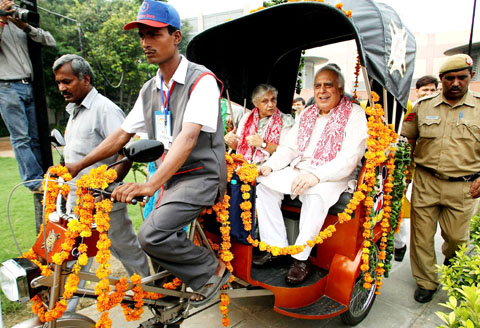It’s been touted as a solution to urban India’s traffic woes, chronic pollution and fossil fuel dependence, as well as an escape from backbreaking human toil.
A state-of-the-art, solar powered version of the humble cycle-rickshaw promises to deliver on all this and more.
The “soleckshaw,” unveiled this month in New Delhi, is a motorized cycle rickshaw that can be pedaled normally or run on a 36-volt solar battery.

PHOTO: AFP
Developed by the state-run Centre for Scientific and Industrial Research (CSIR), prototypes are receiving a baptism of fire by being road-tested in Old Delhi’s Chandni Chowk area.
One of the city’s oldest and busiest markets, dating back to the Moghul era, Chandni Chowk comprises a byzantine maze of narrow, winding streets, choked with buses, cars, scooters, cyclists and brave pedestrians.
“The most important achievement will be improving the lot of rickshaw drivers,” said Pradip Kumar Sarmah, head of the non-profit Centre for Rural Development.
“It will dignify the job and reduce the labor of pedaling. From rickshaw pullers, they will become rickshaw drivers,” Sarmah said.
India has an estimated 8 million cycle-rickshaws.
The makeover includes FM radios and powerpoints for charging mobile phones during rides.
Gone are the flimsy metal and wooden frames that give the regular Delhi rickshaws a tacky, sometimes dubious look.
The “soleckshaw,” which has a top speed of 15kph, has a sturdier frame and seats for up to three people.
The fully charged solar battery will power the rickshaw for 50km to 70km. Used batteries can be deposited at a centralized solar-powered charging station and replaced for a nominal fee.
If the tests go well, the “soleckshaw” will be a key transport link between sporting venues at the 2010 Commonwealth Games in New Delhi.
“Rickshaws were always environment friendly. Now this gives a totally new image that would be more acceptable to the middle-classes,” said Anumita Roychoudhary of the Delhi-based Centre for Science and Environment.
“Rickshaws have to be seen as a part of the solution for modern traffic woes and pollution. They have never been the problem. The problem is the proliferation of automobiles using fossil fuels,” she said.
Initial public reaction to the “soleckshaw” has been generally favorable, and the rickshaw pullers have few doubts about its benefits.
“Pedaling the rickshaw was very difficult for me,” said Bappa Chatterjee, 25, who migrated to the capital from West Bengal and is one of the 500,000 pullers in Delhi.
“I used to suffer chest pains and shortage of breath going up inclines. This is so much easier,” he said.
“Earlier, when people hailed us it was like, ‘Hey you rickshaw puller!’ Police used to harass us, slapping fines even abusing us for what they called wrong parking. Now people look at me with respect,” Chatterjee said.
Another migrant from eastern Bihar state, Mohammed Matin Ansari, said the new model offered parity with car, bus and scooter drivers.
“Now we are as good as them,” he said.
Indian authorities have big dreams for the “soleckshaw.”
Indian Science and Technology Minister Kapil Sibal, who hailed the invention for its “zero carbon foot print,” said it should be used beyond the confines of Delhi.
“Soleckshaws would be ideal for small families visiting the Taj Mahal,” he said.
At present, battery-operated buses ferry people to the iconic monument in Agra — but their limited numbers cannot cope with the heavy tourist rush.
CSIR director Sinha said he hoped an advanced version of the “soleckshaw” with a car-like body would become a viable alternative to the “small car” favored by Indian middle class families.

The Venezuelan government on Monday said that it would close its embassies in Norway and Australia, and open new ones in Burkina Faso and Zimbabwe in a restructuring of its foreign service, after weeks of growing tensions with the US. The closures are part of the “strategic reassignation of resources,” Venezueland President Nicolas Maduro’s government said in a statement, adding that consular services to Venezuelans in Norway and Australia would be provided by diplomatic missions, with details to be shared in the coming days. The Norwegian Ministry of Foreign Affairs said that it had received notice of the embassy closure, but no

A missing fingertip offers a clue to Mako Nishimura’s criminal past as one of Japan’s few female yakuza, but after clawing her way out of the underworld, she now spends her days helping other retired gangsters reintegrate into society. The multibillion-dollar yakuza organized crime network has long ruled over Japan’s drug rings, illicit gambling dens and sex trade. In the past few years, the empire has started to crumble as members have dwindled and laws targeting mafia are tightened. An intensifying police crackdown has shrunk yakuza forces nationwide, with their numbers dipping below 20,000 last year for the first time since records

EXTRADITION FEARS: The legislative changes come five years after a treaty was suspended in response to the territory’s crackdown on democracy advocates Exiled Hong Kong dissidents said they fear UK government plans to restart some extraditions with the territory could put them in greater danger, adding that Hong Kong authorities would use any pretext to pursue them. An amendment to UK extradition laws was passed on Tuesday. It came more than five years after the UK and several other countries suspended extradition treaties with Hong Kong in response to a government crackdown on the democracy movement and its imposition of a National Security Law. The British Home Office said that the suspension of the treaty made all extraditions with Hong Kong impossible “even if

Former Japanese prime minister Tomiichi Murayama, best known for making a statement apologizing over World War II, died yesterday aged 101, officials said. Murayama in 1995 expressed “deep remorse” over the country’s atrocities in Asia. The statement became a benchmark for Tokyo’s subsequent apologies over World War II. “Tomiichi Murayama, the father of Japanese politics, passed away today at 11:28am at a hospital in Oita City at the age of 101,” Social Democratic Party Chairwoman Mizuho Fukushima said. Party Secretary-General Hiroyuki Takano said he had been informed that the former prime minister died of old age. In the landmark statement in August 1995, Murayama said